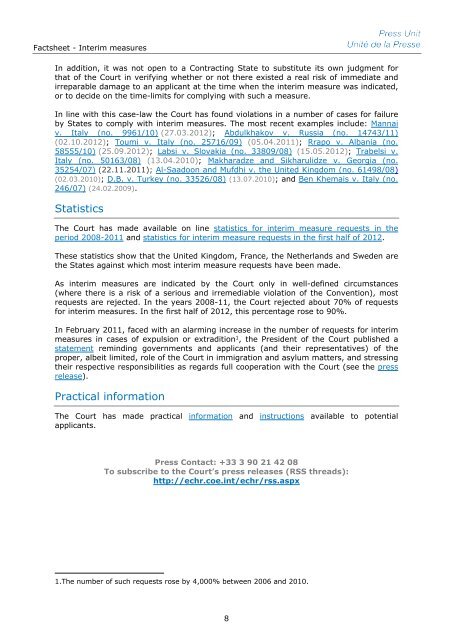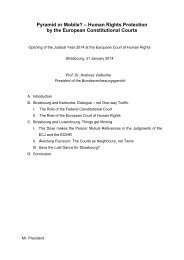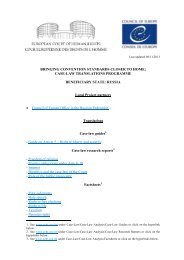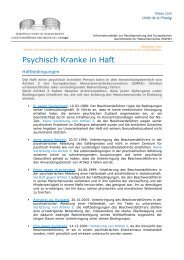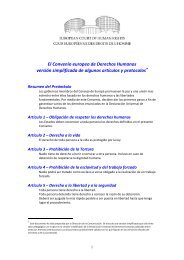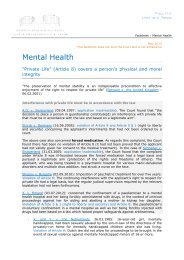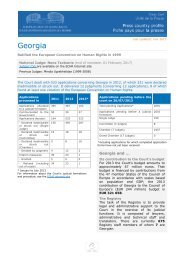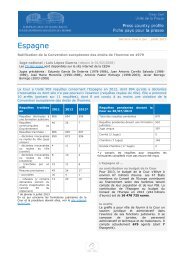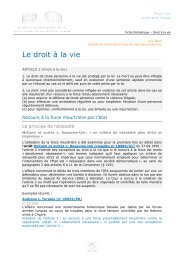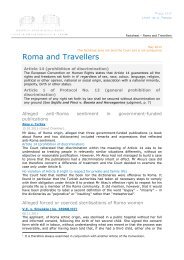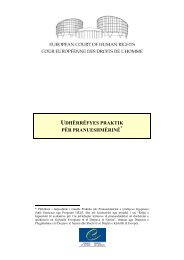Factsheet Interim measures - European Court of Human Rights ...
Factsheet Interim measures - European Court of Human Rights ...
Factsheet Interim measures - European Court of Human Rights ...
Create successful ePaper yourself
Turn your PDF publications into a flip-book with our unique Google optimized e-Paper software.
<strong>Factsheet</strong> - <strong>Interim</strong> <strong>measures</strong><br />
In addition, it was not open to a Contracting State to substitute its own judgment for<br />
that <strong>of</strong> the <strong>Court</strong> in verifying whether or not there existed a real risk <strong>of</strong> immediate and<br />
irreparable damage to an applicant at the time when the interim measure was indicated,<br />
or to decide on the time-limits for complying with such a measure.<br />
In line with this case-law the <strong>Court</strong> has found violations in a number <strong>of</strong> cases for failure<br />
by States to comply with interim <strong>measures</strong>. The most recent examples include: Mannai<br />
v. Italy (no. 9961/10) (27.03.2012); Abdulkhakov v. Russia (no. 14743/11)<br />
(02.10.2012); Toumi v. Italy (no. 25716/09) (05.04.2011); Rrapo v. Albania (no.<br />
58555/10) (25.09.2012); Labsi v. Slovakia (no. 33809/08) (15.05.2012); Trabelsi v.<br />
Italy (no. 50163/08) (13.04.2010); Makharadze and Sikharulidze v. Georgia (no.<br />
35254/07) (22.11.2011); Al-Saadoon and Mufdhi v. the United Kingdom (no. 61498/08)<br />
(02.03.2010); D.B. v. Turkey (no. 33526/08) (13.07.2010); and Ben Khemais v. Italy (no.<br />
246/07) (24.02.2009).<br />
Statistics<br />
The <strong>Court</strong> has made available on line statistics for interim measure requests in the<br />
period 2008-2011 and statistics for interim measure requests in the first half <strong>of</strong> 2012.<br />
These statistics show that the United Kingdom, France, the Netherlands and Sweden are<br />
the States against which most interim measure requests have been made.<br />
As interim <strong>measures</strong> are indicated by the <strong>Court</strong> only in well-defined circumstances<br />
(where there is a risk <strong>of</strong> a serious and irremediable violation <strong>of</strong> the Convention), most<br />
requests are rejected. In the years 2008-11, the <strong>Court</strong> rejected about 70% <strong>of</strong> requests<br />
for interim <strong>measures</strong>. In the first half <strong>of</strong> 2012, this percentage rose to 90%.<br />
In February 2011, faced with an alarming increase in the number <strong>of</strong> requests for interim<br />
<strong>measures</strong> in cases <strong>of</strong> expulsion or extradition 1 , the President <strong>of</strong> the <strong>Court</strong> published a<br />
statement reminding governments and applicants (and their representatives) <strong>of</strong> the<br />
proper, albeit limited, role <strong>of</strong> the <strong>Court</strong> in immigration and asylum matters, and stressing<br />
their respective responsibilities as regards full cooperation with the <strong>Court</strong> (see the press<br />
release).<br />
Practical information<br />
The <strong>Court</strong> has made practical information and instructions available to potential<br />
applicants.<br />
Press Contact: +33 3 90 21 42 08<br />
To subscribe to the <strong>Court</strong>’s press releases (RSS threads):<br />
http://echr.coe.int/echr/rss.aspx<br />
1.The number <strong>of</strong> such requests rose by 4,000% between 2006 and 2010.<br />
8


